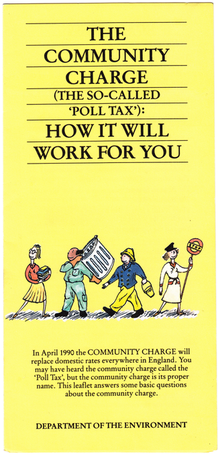You obviously haven't thought very hard then - because I can think of a perfectly logical reason for why the Government would have wanted to introduce the poll tax that doesn't involve imagining some kind of bad faith by the Government or some strange desire to attack lots of voters: The rating system was generally considered at the time to be in need of reform, and there was a serious argument being made that, since each person tended to benefit equally from the services the council provided, it was only fair that each person paid roughly the same towards them (if this seems unfair today, bear in mind that at the time, what people paid in rates was much less than what people typically paid in taxes, so you were talking about a small proportion of what people paid in taxes. Also, the poll tax did provide discounts for people who were unemployed and at the time there wasn't a big political issue of in-work poverty in the way there is today, so many people would have considered it reasonable to assume that anyone in work could afford to pay a poll tax).
Separately from that, a big political issue at the time was that many people and most Conservatives believed (arguably with some justification) that lots of councils were being profligate and wasteful with public money, and wanted some system that would discourage them from over-spending. It was a different World from today: Councils were not so cash-strapped as today and there were fewer restrictions on what they could spend money on, and there was a fairly recent history of a few Labour-run councils deliberately seeking to spend to bankruptcy apparently mainly in order to make political points). The argument was being made that, if everyone paid the same amount, that would increase transparency of how much councils were spending and therefore encourage councils to be more efficient.
In that context, it's not at all hard to see how lots of people might have been convinced that the poll tax would be a good idea. Of course, the hindsight of history shows otherwise but - it's easy to criticise decisions in the past when you already have that hindsight.
Err... I remember the Poll Tax very well, thank you. And paid it. It was officially called the Community Charge, too.
But the old rates system was terrible, but instead of having some local income taxation or other phased charging system, or working with rogue councils, which were already being subjected to "rate-capping". (Some councils reacted by defiance. Liverpool springs to mind.) Thatcher took the easy way out in an act of collective punishment, and was almost certainly told at the time, even within her own party, that this policy would bring misery and heartache.
I seem to remember on introduction of the Community Charge, L B Wandsworth's charge was actually Zero, and LB City of Westminster was a just few pounds: both had Tory councils and/or returned Tory MPs.
The system that replaced it and continues today, is still crude and divisive, takes little account for the ability to pay, and is monstrously out of date.
But what did for the Community Charge was a whole host of reasons apart from the huge unpopularity: Defaulters, both actual and political; some councils actually
increasing their revenue; errors during the changeover period; people not registering; difficulties in collection; etc., etc., etc.
But you need to remember this: Thatcher did not care.

